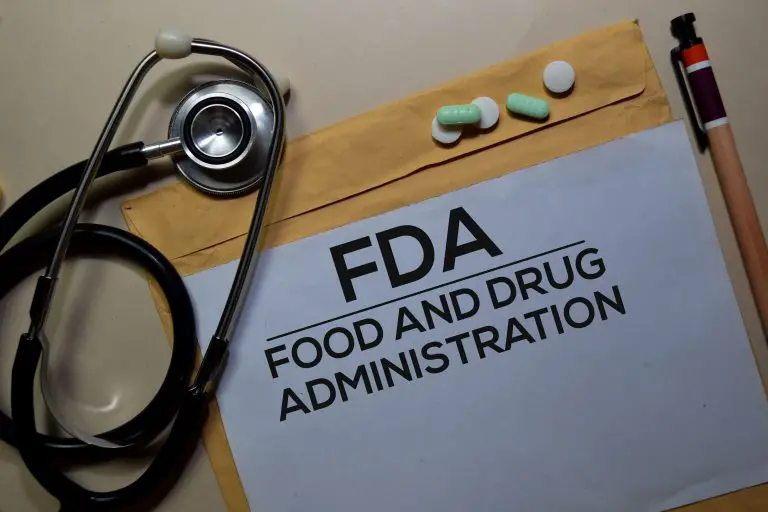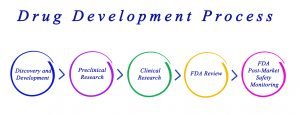
Page Contents
The answer to is Nutrafol FDA approved or not is not as simple or straightforward as you might think. Technically, it should be a simple question that any Nutrafol review can answer, but that doesn’t mean it is.
However, FDA approval isn’t actually as straightforward of a thing in this case as you might think. So, first we’ll see what Nutrafol says, and then we’ll look at what FDA approval entails. Hopefully, any FDA-related questions you might have in regards to where Nutrafol falls will be answered along the way.
The Answer Nutrafol Gives
On the Nutrafol website, they have a customary FAQ section. One of the questions they have there is: Is Nutrafol FDA Approved? However, they don’t give what I would call a straightforward answer to that question.  Instead, the first thing Nutrafol says is that the FDA doesn’t regulate supplements, only prescriptions and over-the-counter drugs. Then, Nutrafol reminds you that their supplement is 100% drug-free.
Instead, the first thing Nutrafol says is that the FDA doesn’t regulate supplements, only prescriptions and over-the-counter drugs. Then, Nutrafol reminds you that their supplement is 100% drug-free.
After that, Nutrafol tells you that their hair growth product is made in the USA in an FDA-certified facility. This is not the same thing as the Nutrafol hair loss products being certified by the FDA.
They then add that they also adhere to the Current Good Manufacturing Practices (CGMPs) and the States Food and Drug Administration (FDA) requirements. And that is all Nutrafol says about the matter.
Essentially, this means that Nutrafol is not FDA certified as far as their Nutrafol supplement products go. Their facilities are another thing entirely, and it is certainly a good thing that they have that at least.
Nutrafol also goes into a little more detail about their manufacturing a little further down in their FAQ. The question here is: Where Is Nutrafol Manufactured?
There, they talk a little about what GMP guidelines are, mention the fact that Nutrafol has been in the supplement business for well over 20 years, and reiterate that their facilities are registered with the FDA. Nutrafol then ends by saying that they test all their supplements for certain things and only get the best ingredients.
However, exactly where the Nutrafol facilities are at, they don’t say. So, I don’t feel that Nutrafol does a very good job of answering that question either. When I ask where something is manufactured, I am not really looking for information about how the facility works so much as a location.
Is This Correct?
Going back over Nutrafol’s reply, the first thing they say is that the FDA regulates only prescriptions and drugs. This is correct, but only to a point. Let’s first go over the FDA’s definition of what a supplement is.
A supplement, according to the FDA, is something that has a dietary ingredient. It also has to be labeled as a dietary supplement, with the Dietary Supplement Health and Education Act (DSHEA) being responsible for exactly how a supplement has to be labeled.
However, while supplements can say that they are useful for certain things, they are not allowed to say that they treat any medical condition without FDA approval for such a statement.
In other words, since Nutrafol Men claims to help male pattern baldness, even though it has had clinical studies done on it, the FDA has not verified such a statement. This is why Nutrafol Men and the other Nutrafol products are only considered by them to be a supplement.
The FDA says that they will only stop a supplement from being produced if a certain amount of people have a reaction to it. Other than that, and the DSHEA controlling the labeling, the FDA doesn’t do anything.
This means that, according to the FDA, the Nutrafol Men supplement can’t be used to treat alopecia areata in men. Nutrafol can make all the claims it likes about how it helps with hair restoration and is a great, healthy hair loss treatment for those with pattern hair loss.
In short, if Nutrafol were FDA-approved for treating androgenetic alopecia, it wouldn’t label itself as a hair supplement. The Nutrafol supplement would instead be called a treatment on the label. Because it can’t say that, it instead is just a hair supplement that is widely used for thinning hair.
A Word On The Dietary Supplement Health and Education Act Requirements
As mentioned, it is the DSHEA that regulates supplements. All this act mostly does is that it regulates supplements by stating what all has to be put on the label. This act was put into place because some didn’t want the FDA to regulate supplements the same way they did drugs and other things.
For starters, the supplement has to have the word ‘supplement’ somewhere on it. This has to be either ‘dietary supplement’ or it can be the name of what supplement it is. For example, in the case of a supplement of Vitamin C, it can say that it is a Vitamin C supplement.
Next, it has to say how many pills, tablets, etc., are in a container of it. This would be the Nutrafol Men having 120 capsules in it, for example. A supplement also must have a dosage (again, this is why Nutrafol Men says a serving size is four capsules).
Any supplement that has a known daily amount that you need is also required to list that as a percentage. Using Vitamin D as an example here, on a Vitamin D supplement there is a known daily amount you need. So, any supplement with Vitamin D in it has to give a percentage of the daily amount it has in it.
Other than those things, a supplement must also list what is in it. Any natural ingredients that aren’t considered nutrients are to be listed in descending order of amount.
This means that Nutrafol Womens Balance lists organic gelatinized maca (root) powder before its saw palmetto because there is more of the maca root than there is of the other, at least as far as the weight goes. Though there are a few other requirements the DSHEA has, those are the main ones.
Getting FDA Approval

The FDA has a whole approval process for anything that wants to call itself an official treatment for thinning hair. There are essentially four main steps in this process, with three different key things being looked at.
The first step is a drug is made, discovered, or specifically crafted for something like hair loss, for example. Next, for the next step it has to first be tested on animals in a lab to show that it is safe for living beings and to hopefully show that it has the right benefits, like causing hair growth.
The third step is the three clinical studies that have to be done. The first being of a small group (-100 people), the second being of a slightly larger group (100-1,000 people), and the last being with a group that has a few thousand people in it.
This is where the three key things come in, as there are three things the FDA looks at with these clinical studies. These are the benefits, the risks, and what the condition is. If a condition or disease is very bad, then higher risks are considered acceptable.
The fourth step is all of this information has to be submitted to the FDA and approved by them. If that works and the product or treatment passes their inspection, the facility where it is made is also inspected and has to pass.
It is only after that a product can make the claim to be FDA approved. However, the FDA can approve certain facilities regardless of whether or not the product that is made in them goes through this process.
Related Reading
Nutrafol Getting FDA Approval
Though Nutrafol does say that it has had clinical studies done on it, it hasn’t had the required three that the FDA approval would need. On that note, Nutrafol doesn’t even seem to say how many people were in each of their trials.
I don’t know if each Nutrafol supplement would have to get verified by the FDA or not. Perhaps getting just the Nutrafol Woman FDA-approved would be enough to count for the Nutrafol Postpartum and the Nutrafol Womens Balance as well.
Perhaps each Nutrafol supplement would have to be tested by the FDA to see if it really does cause hair regrowth. If Nutrafol would have to do that for each product, it might make sense as to why they haven’t taken the time to do that.
However, even doing that wouldn’t accomplish anything for Nutrafol’s other products. Nutrafol has a few products they call Wellness Boosters, including a Stress Adaptogen, a Detox one, and a couple of others.
Final Thoughts
All in all, it is understandable that Nutrafol doesn’t have FDA approval, since the Nutrafol supplement is not a drug. However, having something that is FDA-approved to help with hair loss can make you feel more confident about using it.
That said, there are very few treatments that the FDA has approved for hair loss. These range from laser therapy to minoxidil, but none of them is a healthy supplement like Nutrafol.
So, essentially it boils down to either getting an FDA-approved hair loss treatment or getting a hair loss treatment that isn’t FDA-approved but that is healthier overall for you to try. Pricewise, products like Nutrafol can be just as expensive too.
Nutrafol is still a great supplement for growing thicker and stronger hair, but you should keep in mind that it is just a supplement. This is true even if the odds of it working for you are about the same as the odds of a drug like minoxidil working for your hair quality.






